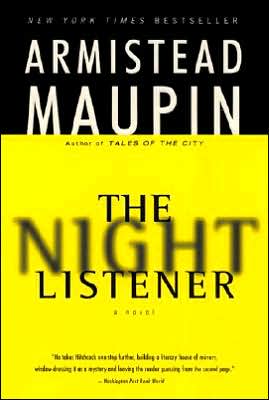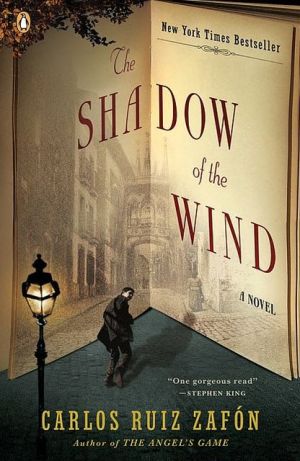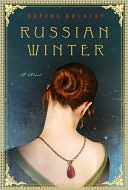Night Listener
"I'm a fabulist by trade," warns Gabriel Noone, a late-night radio storyteller, as he begins to untangle the skeins of his tumultuous life: his crumbling ten-year love affair, his disaffection from his Southern father, his longtime weakness for ignoring reality. Gabriel's most sympathetic listener is Pete Lomax, a thirteen-year-old fan in Wisconsin whose own horrific past has left him wise and generous beyond his years. But when this virtual father-son relationship is rocked by doubt, a...
Search in google:
After an absence of eight years, Armistead Maupin returns with the tale of Gabriel Noone, a writer whose cult-hit radio serial "Noone at Night" has brought him into the homes of millions. Noone is in the midst of a painful separation from his lover of 10 years when a publisher sends him proofs of a remarkable book: the memoir of an ailing 13-year-old boy who suffered horrific sexual abuse at the hands of his parents. Now living with his adoptive mother, Donna, Pete Lomax is not only a brave and gifted diarist but a devoted listener of Noone's show. When Noone phones the boy to offer encouragement, it soon becomes clear that Pete sees in this heartsick middle-aged storyteller the loving father he's always wanted. Thus begins an extraordinary friendship that only grows deeper as the boy's health deteriorates, freeing Noone to unlock his innermost feelings.Then, out of the blue, troubling new questions arise, exploding Noone's comfortable assumptions and causing his ordered existence to spin wildly out to control. As he walks a line between truth and illusion, he is finally forced to confront all of his relationships—familial, romantic, and erotic. As complex and hypnotically engrossing as the best of mysteries, The Night Listener is an astonishing tour de force that will move and challenge Maupin's readers as never before.Philadelphia InquirerFor this, the audio format is all but a requirement...the whole book is an exploration of the power of voice.
Chapter One\ Jwelling The Elephant\ I know how it sounds when I call him my son. There's something a little precious about it, a little too wishful to be taken seriously. I've noticed the looks on people's faces, those dim, indulgent smiles that vanish in a heartbeat. It's easy enough to see how they've pegged me: an unfulfilled man on the shady side of fifty, making a last grasp at fatherhood with somebody else's child.That's not the way it is. Frankly, I've never wanted a kid. Never once believed that nature's whim had robbed me of my manly destiny. Pete and I were an accident, pure and simple, a collision of kindred spirits that had nothing to do with paternal urges, latent or otherwise. That much I can tell you for sure.\ Son isn't the right word, of course.\ Just the only one big enough to describe what happened.\ I'm a fabulist by trade, so be forewarned: I've spent years looting my life for fiction. Like a magpie, I save the shiny stuff and discard the rest; it's of no use to me if it doesn't serve the geometry of the story. This makes me less than reliable when it comes to the facts. Ask Jess Carmody, who lived with me for ten years and observed this affliction firsthand. He even had a name for it'The Jewelled Elephant Syndrome'after a story I once told him about an old friend from college.\ My friend, whose name was Boyd, joined the Peace Corps in the late sixties. He was sent to a village in India where he fell in love with a local girl and eventually proposed to her. But Boyd's blue-blooded parents back in South Carolina were so aghast at the prospect of dusky grandchildren that they refused to attend the wedding in NewDelhi.\ So Boyd sent them photographs. The bride turned out to be an aristocrat of the highest caste, better bred by far than any member of Boyd's family. The couple had been wed in regal splendor, perched atop a pair of jewelled elephants. Boyd's parents, imprisoned in their middle-class snobbery, had managed to miss the social event of a lifetime.\ I had told that story so often that Jess knew it by heart. So when Boyd came to town on business and met Jess for the first time, Jess was sure he had the perfect opener. "Well," he said brightly, "Gabriel tells me you got married on an elephant."Boyd just blinked at him in confusion.\ I could already feel myself reddening. "You weren't?"\ "No," Boyd said with an uncomfortable laugh. "We were married in a Presbyterian church."\ Jess said nothing, but he gave me a heavy-lidded stare whose meaning I had long before learned to decipher: You are never to be trusted with the facts.\ In my defense, the essence of the story had been true. Boyd had indeed married an Indian girl he had met in the Peace Corps, and she had proved to be quite rich. And Boyd's parents'who were, in fact, exceptionally stuffy'had always regretted that they'd missed the wedding.\ I don't know what to say about those elephants, except that I believed in them utterly. They certainly never felt like a lie. More like a kind of shorthand for a larger, less satisfying truth. Most stories have holes in them that cry out for jewelled elephants. And my instinct, alas, is to supply them.\ I don't want that to happen when I talk about Pete. I will try to lay out the facts exactly as I remember them, one after the other, as unbejewelled as possible. I owe that much to my son'to both of us, really'and to the unscripted intrigues of everyday life.But, most of all, I want you to believe this.And that will be hard enough as it is.\ I wasn't myself the afternoon that Pete appeared. Or maybe more severely myself than I had ever been. Jess had left me two weeks earlier, and I was raw with the realization of it. I have never known sorrow to be such a physical thing, an actual presence that weighed on my limbs like something wet and woolen. I couldn't write'or wouldn't, at any rate'unable to face the grueling self-scrutiny that fiction demands. I would feed the dog, walk him, check the mail, feed myself, do the dishes, lie on the sofa for hours watching television.\ Everything seemed pertinent to my pain. The silliest coffee commercial could plunge me into profound Chekhovian gloom. There was no way around the self-doubt or the panic or the anger. My marriage had exploded in midair, strewing itself across the landscape, and all I could do was search the rubble for some sign of a probable cause, some telltale black box.\ The things I knew for sure had become a litany I recited to friends on the telephone: Jess had taken an apartment on Buena Vista Park. He wanted space, he said, a place to be alone. He had spent a decade expecting to die, and now he planned to think about living. (He could actually do that, he realized, without having to call it denial.) He would meditate and read, and focus on himself for once. He couldn't say for sure when he'd be back, or if he'd ever be back, or if I'd even want him when it was over. I was not to take this personally, he said; it had nothing to do with me.\ Then, after stuffing his saddlebags full of protease inhibitors, he pecked me solemnly on the lips and mounted the red motorcycle he had taught himself to ride six months earlier. I'd never trusted that machine. Now, as I watched it roar off down the hill, I realized why: It had always seemed made for this moment.
\ From Barnes & NobleIn the 19th century, almost every novelist -- from Dickens to Dostoevsky -- published his fiction serially in newspapers. By the end of the 20th century, Armistead Maupin, whose wildly popular Tales of the City first appeared in The San Francisco Chronicle, was one of the few remaining practitioners of the form. In his latest novel, The Night Listener, Maupin draws on his experience of being at the center of this serial phenomenon with a compelling story about a celebrity yarn-spinner who finds himself on the listening end of a tale he wants desperately to believe.\ \ \ \ \ Philadelphia InquirerFor this, the audio format is all but a requirement...the whole book is an exploration of the power of voice.\ \ \ Times Literary SupplementA consummate entertainer...It is Maupin's Dickensian gift to be able to render love convincingly...He works his dialogue with a jeweler's precision and a playwright's development of dramatic irony.\ \ \ \ \ Publishers WeeklyHAfter an eight-year wait, Maupin rewards his fans and accomplishes the unthinkable: surpassing the excellence of his Tales of the City series. Filled with twists and turns that rival The Sixth Sense and The Crying Game, Maupin's new novel is a deceptively simple page-turner perfectly suited for the audio format. Surprises that would be telegraphed in a film are perfectly sprung on listeners. Not only is it a book that listeners will want to discuss with friends, but once finished and all is revealed, it's likely people will want to listen to it again with a fresh ear to hear the clues that have been planted along the way. Maupin's most reflective, full-bodied and autobiographical novel yet begins with alter ego Gabriel Noone, author of the cult radio serial Noone at Night, facing two disruptions in his calm, settled life: his longtime lover, Jess, has moved out and Gabe has developed writer's block. Amid this stress, Gabe's editor asks him to read a manuscript written by an HIV-positive 13-year-old named Pete Lomax that details his escape from years of sexual and physical abuse. Gabe is so moved, he calls the boy and a friendship develops. His relationship with Pete (and Pete's adoptive mother, Donna) helps clarify other troubled relationships in his life while opening up new questions concerning trust, truth and friendship. Maupin presents his tale with such polished, effortless elegance that his talent can be underestimated because the sweat behind it is so invisible. Maupin's melodious, expressive reading reinforces his smooth prose, which is written to be read aloud. Audio is the perfect medium for this born storyteller. Simultaneous release with the HarperCollins hardcover (Forecasts, Aug. 7). (Oct.) Copyright 2000 Cahners Business Information.\ \ \ \ \ Library JournalGabriel Noone is a successful writer whose radio serial, Noone at Night, has brought him legions of fans and affectionate fame. But his long-term companion, Jess, has just left him, and he's a mess: he can't write, he can't communicate with his father, and he can't understand why Jess is suddenly changing. Enter a special fan, a sick 13-year-old boy who forms a deep connection with Gabriel over the radio and telephone. Peter Lomax was severely abused as a child but finds he can trust Gabriel, who in turn discovers he can open himself up to this amazing boy. However, Gabriel slowly begins to doubt his young friend, just as he has had to doubt other important figures in his life. While the novel centers on the mysterious Peter, Maupin's (Maybe the Moon) latest is less a suspense story than a likable tale about major and minor betrayals by lovers, friends, and family members. [Previewed in Prepub Alert, LJ 6/15/00.]--Devon Thomas, Hass Assocs., Ann Arbor, MI Copyright 2000 Cahners Business Information.\\\ \ \ \ \ Karen Karbo. . . a solid page turner . . . a mystery studded with elegant twists and turns. In the end, the reader is captivated and won't be able to get on with things until The Night Listener is wolfed down whole.\ —New York Times Book Review\ \ \ \ \ Penelope MesicLate at night, a thirteen-year-old boy named Pete, hideously abused by his parents and by strangers, lies mercifully alone, drifting on waves of static into the safe harbor of a late-night radio show, a cheerful narrative loosely based on the life of its narrator, Gabriel Noone. It is here that one of the most tantalizing relationships in recent fiction begins. Noone bears a teasingly strong resemblance to the author of The Night Listener, Armistead Maupin. For decades Maupin has offered his captivated following Tales of the City--that city being San Francisco--and, as the popularity of his work has soared, More Tales and Further Tales, chronicling the interlinked lives of Nob Hill blue bloods and North Beach bohemians, Castro Street couples shaken by the storms of HIV, surgeons secretly in love with patients, sad office temps unwittingly on the verge of fame as models, generous eccentrics extending the gift of friendship to the hidebound and even the occasional sorry bastard nourishing a homicidal impulse or two. Like the elusive, much victimized young boy at the center of Maupin's deceptively loose but cunningly made novel, readers (and watchers of the television series derived from the Tales) have responded to the rare quality of Maupin's work, which could be called a sort of ambrosial gossip--racy and intimate but utterly devoid of malice. Maupin takes a wonderfully evenhanded approach to characters of every age, race, social background and sexual predilection. His world--and by extension, Noone's--is one of joyous social freedom. And yet this mellow realm of friendship has its root in ostracism, for Noone counts himself among the "people caught in the supreme joke of modern life, who [are] forced to survive by making families of their friends." It is perhaps this quality that draws Pete--essentially orphaned by his parents' mistreatment and by the welcome fact of their being jailed--to Noone. And Noone reciprocates. He learns of Pete's existence when a publisher sends him a book the child has written about the abuse he has suffered, his consequent struggle with HIV infection and his new life with a psychologist named Donna, who has become his foster mother. Deserted by his lover and companion of ten years, Noone is at a strangely vulnerable point in his life. When he phones the child, the impulse arises from loneliness as well as sympathy. Soon, he secretly finds himself thinking of Pete as his son, even though he realizes that others will pityingly regard him as "an unfulfilled man on the shady side of fifty, making a last grasp at fatherhood." He warns us, accurately, that the relationship is far more complicated than that. Over the course of many phone calls, the astringent good sense of the child, his simplicity and humor, compels Noone's affection. He flies to the tiny Wisconsin town to search for the "midwestern address jangling with consonants" where he has sent the child packages. He finds the water tower painted with graffiti the boy has described seeing from his bedroom window. But the child's address turns out to be a postal box service. Is the child simply being protected from those who formerly preyed on him? Or is there a stranger explanation for his remaining unseen and out of reach? That is precisely the question the novel refuses to answer. To say more would give away too much about the startling turns the narrative takes. It is sufficient to add that the novel, which relies on Maupin's exquisitely well-developed sense of how readers respond, raises issues about who it is we love when we say we love someone. It also explores the strange phenomenon of the emotions aroused by fiction--the phantom love that aches like the real thing, that readers feel for characters who have never lived. All this is done in the most natural, conversational and unaffected way in the world--less like reading Sartre than having coffee with a dear friend and trying to puzzle out why a relationship has ended. It's a wise reminder that all the mysteries of philosophy have their root in daily life. While retaining all the most endearing characteristics of his short stories, Maupin here demonstrates a wonderful ability to sustain interest not simply in human eventfulness but in the larger implications of what we say and do and feel.\ \ \ \ \ Kirkus ReviewsA touching but rather facile meditation on the way artists manipulate facts in their quest for truth, by the author of Maybe the Moon (1992) and the popular Tales of the City series. Gabriel Noone's NPR program, Noone at Night, later turned into a bestselling series of books, has made Gabriel a poster boy for the well-adjusted gay lifestyle—except that, as the story opens, his long-time lover, Jess, has moved out, "to focus on himself for once." At this fragile moment, Gabriel receives the galleys of a memoir by Pete, a 13-year-old boy dying of AIDS as a result of protracted sexual abuse at the hands of his parents and their customers. Moved by the book's grit and humor, Gabriel contacts Pete, who now lives with Donna Lomax, the doctor who rescued and adopted him. The two bond over the telephone, and this new friendship helps Gabriel cope with the pain of Jess's departure and the ongoing angst of his unresolved relationship with his crotchety father, an old-line southern gentleman who has never been comfortable with Gabriel's sexual orientation—or with emotions of any kind. But then Jess points out that neither Gabriel nor anyone else has ever seen Pete, and that the boy's voice bears striking resemblance to Donna's. Is Jess just jealous, or is he performing his usual task of reasserting reality for Gabriel, "a fabulist by trade" who for years, in completely good faith, embellished a friend's actual wedding in India with a completely fictitious jeweled elephant. Gabriel's doubts about Pete grow, but he's unwilling to let go of his beloved phone buddy, who is clearly telling the truth about someone's agonized past.Thedeathbed reconciliation between Gabriel and his father is trite, but the final phone call from Pete (by now supposedly dead) will give you the creeps and move you to tears almost simultaneously. The postmodern, what-is-real? theme highlights Maupin's intellectual shortcomings rather than his emotional strengths, but strong storytelling, punchy humor, and a warmhearted narrator carry the day. Author tour\ \








